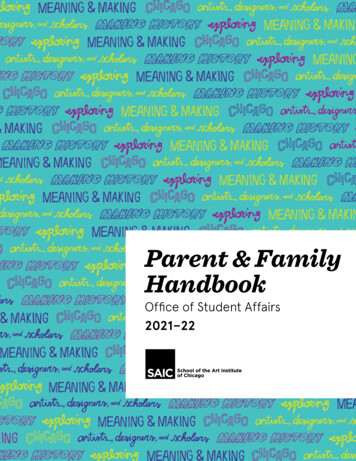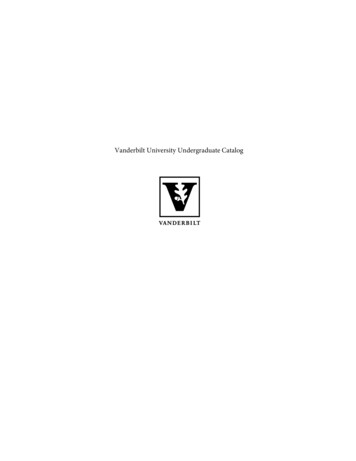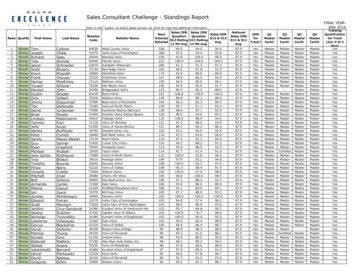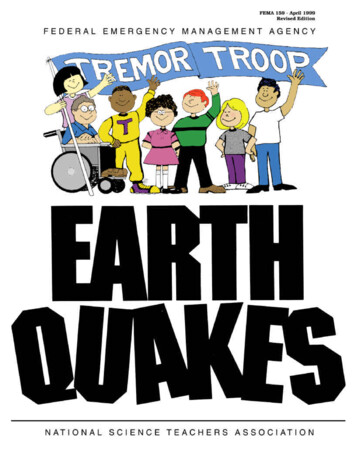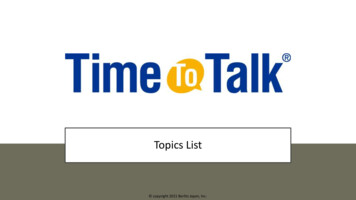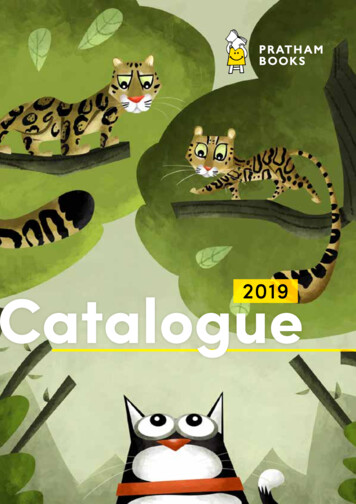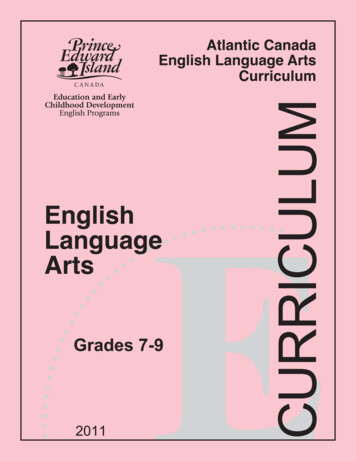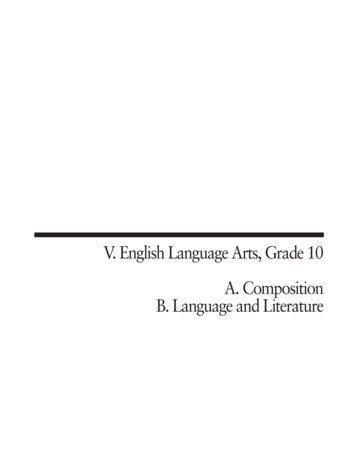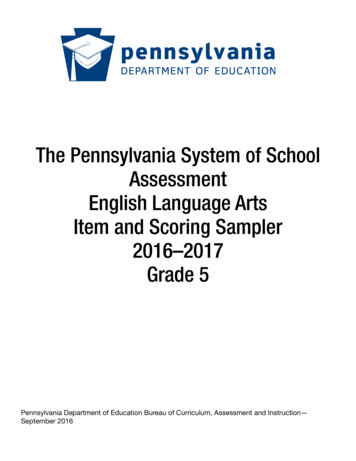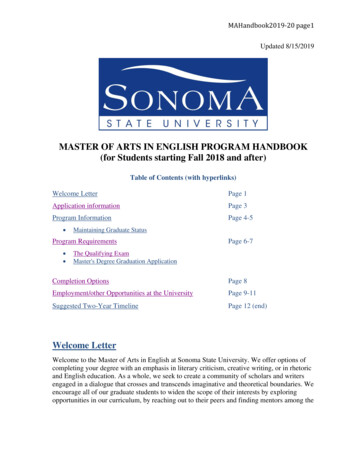
Transcription
MAHandbook2019-20 page1Updated 8/15/2019MASTER OF ARTS IN ENGLISH PROGRAM HANDBOOK(for Students starting Fall 2018 and after)Table of Contents (with hyperlinks)Welcome LetterPage 1Application informationPage 3Program InformationPage 4-5 Maintaining Graduate StatusProgram Requirements Page 6-7The Qualifying ExamMaster's Degree Graduation ApplicationCompletion OptionsPage 8Employment/other Opportunities at the UniversityPage 9-11Suggested Two-Year TimelinePage 12 (end)Welcome LetterWelcome to the Master of Arts in English at Sonoma State University. We offer options ofcompleting your degree with an emphasis in literary criticism, creative writing, or in rhetoricand English education. As a whole, we seek to create a community of scholars and writersengaged in a dialogue that crosses and transcends imaginative and theoretical boundaries. Weencourage all of our graduate students to widen the scope of their interests by exploringopportunities in our curriculum, by reaching out to their peers and finding mentors among the
MAHandbook2019-20 page2English department’s graduate faculty, and by participating fully in the life of thedepartment.This online handbook provides information on how to apply to the M.A. in English and helpsnewly admitted students gain a sense of what to expect as they navigate their way through theprogram.Once you are admitted to the graduate program, you have to complete the followingacademic steps to ensure your: Pass all required coursework, Successfully take the department's Qualifying Exam; or achieve a 65th percentilescore on the GRE Subject exam in Literature; or work as a survey course teachingassistant for two semesters. Complete your thesis/creative project.You will also need to follow these administrative procedures necessary for graduation: File a "Master's Degree Graduation Application" form at the outset of the semesteryou wish to graduate with the Office of Admissions and Records. At the end of your first year, select your completion option (literary criticism, creativewriting, rhetoric and English education), constitute your committee (two graduatefaculty members), and file an "Advancement to Candidacy" form (GS01) withGraduate Studies. The deadline is April 30th. After completion of your thesis/creative project, file the "Completion ofRequirements" form (GS02) with Graduate Studies.These steps are explained in detail below, together with supplementary information you mayfind useful in obtaining your degree. Meeting requirements and published deadlines is yourresponsibility, and we hope this guide will assist you to do so. It is most important for you tomaintain frequent contact with the graduate coordinator, and, as you advance through theprogram, your thesis or creative project supervisor.Congratulations upon your decision to pursue a Master's in English. We look forward toworking with you.Dr. Chingling WoGraduate CoordinatorProfessor of English342 Nichols Hallwo@sonoma.edu707-664-2164
MAHandbook2019-20 page3Application InformationCandidates for admission must apply online via Cal State Apply(https://www2.calstate.edu/apply). Deadline for admission for fall 2020-spring 2021academic year is early March, 2020. The minimum GPA required of applicants withinthe last 60 units of undergraduate coursework is 3.0. (Please note that the EnglishDepartment does not offer deferred admission; admitted students who do notmatriculate must reapply if they wish to be readmitted).Documents you need to submit: Official copies of all transcripts A statement of purpose not longer than two pages or 500 words that identifiesapplicant's field of interest: Literary Criticism, Creative Writing, or EnglishEducation/Rhetoric. An expository prose sample/professional paper (10-20 pages). Three letters of recommendation. We prefer at least two of the three letters be fromreferees who are familiar with your academic work. Creative Writing students should send additional samples of poetry (10 pagesmaximum), or fiction or nonfiction prose (or a combination of genres—20 pagesmaximum).M.A. Completion Options: Literary Criticism or English Education/Rhetoric students complete their degree bywriting a thesis that involves literary criticism/theory or an English Education/rhetoricfocus. Creative writing students will complete their degree by producing a manuscriptproject of fiction, poetry, non-fiction or hybrid/cross-genre creative work. Eachmanuscript will be proceeded by a critical introduction.If admitted as Conditionally Classified: Under special circumstances, students may berequired to undertake additional coursework at the undergraduate level, if, for example, theyhave a Bachelor’s degree in a discipline other than English. For example, if you areconditionally classified, you will be required to complete any pre-requisite coursework by theclose of your first year in the M.A. program, unless you have made other arrangements withthe Graduate Coordinator. If you are admitted as conditionally classified, it is yourresponsibility to: Contact the graduate coordinator early on to discuss your pre-requisite coursework. Complete this additional coursework by the close of your first year, unless you havebeen granted additional time by the graduate coordinator. Contact the graduate coordinator to file a "Change in Graduate Status" form with theGraduate Division to establish your status as a classified student.
MAHandbook2019-20 page4Program InformationMaintaining Graduate Status: To graduate, you must maintain continuous enrollment at SSU while you takecoursework, after advancement to candidacy, and during the semester in which youexpect to receive your degree.You can take a one-semester leave from the university without endangering yourstatus. If you choose to take two or more semesters leave, you will need to submit afull application to reinstate yourself as a student in good standing.In extraordinary circumstances and with the support of the graduate coordinator,students may petition the Graduate Studies Office for a leave of absence not toexceed two years.Students advanced to candidacy who are working on their completion projects andwho have completed all units for their degree may enroll through the Office ofExtended Education in project continuation (578) for 1 unit. This low- cost optionenables students to remain in good standing and entitles them to library privileges.The unit does not count toward financial aid.Finally, it is important to remember that no courses taken more than seven yearsprior to completion of your degree may count toward the MA.Working with the Graduate Coordinator: Newly admitted students will meet with the graduate coordinator at the outset of theterm. If you can't make the scheduled group meeting, please set up an individualappointment. Continuing students should consult with the graduate coordinator as they plan theirresearch or coursework each semester. In general, it is best to make arrangements tomeet with the graduate coordinator in person.Working with Faculty Mentors: Relationships with faculty mentors are perhaps the most important associations youwill develop during your career here. There are two kinds of mentors: 1) the formalaffiliations you establish with the faculty members you select to serve on your thesiscommittee and 2) informal relationships with other faculty with whom you shareresearch interests or with whom you have taken classes. Selecting your thesis committee, which consists of a supervisor (first reader), and asecond reader, is your responsibility, although you may find consulting withinformal mentors as well as other students helpful. It is also your responsibility to setup regular meetings with your committee to keep them informed of your progress,and to ensure that you provide your readers with adequate time in which to readdrafts of your work (a good rule of thumb is to allow a two-week turn-around-time,though it is best to clarify expectations with each member of your committee). Once your committee members agree to serve, they bear responsibilities toward youin turn. You can expect to work most closely with your supervisor, who will read
MAHandbook2019-20 page5and critique drafts of your work as it develops, and who will guide you as youundertake the revision process. The responsibilities of the second reader are lessextensive, although in individual cases, second readers too, may expect to readmultiple drafts of your work. Typically, however, your second reader will critiqueyour work after you have finished a complete draft. (In the end, however, it is up toyou and your mentors jointly to determine how often each expects to meet with youand to review your work. Make sure to get from each a clear sense of theirexpectations at the outset.) Literature or English Education students writing theses will meet formally with bothmembers of their committee during the oral defense, which follows approximately aweek after the thesis itself is turned in, as will those who select the comprehensiveexam option as their completion project. Creative Writing students will participate in an oral reading of their creative workupon completion of their project. Your thesis advisor will assist in arranging publicreadings with your peers.Please remember that you must constitute your committee by April 30th of yourfirst year of study. Even if you do not yet have a clear idea of what you will beworking on, you need to be in touch with your committee members and informthe graduate coordinator of your decision.Staying in touch, joining our community: All graduate students are asked to inform the department Administrative Coordinator,Rheannon Torres, of any changes to their mailing address or to their current emailaddress. Note that all students are provided with an e-mail account by the university, and this SSUaccount is the default address to which the university will send information aboutregistering and other campus information. The department maintains an M.A. listserv,through which departmental and program information is disseminated. The "Englishgrads" listserv circulates job and course announcements, deadline notices, reminders ofESA events, Writers at Sonoma readings, and other information deemed useful to thegraduate community.Sonoma State University and the English Department are strongly committed to creating aproductive learning and living environment that promotes the rights, safety, dignity, andvalue of every individual. It is fundamental to our mission to promote a civil, respectful, andinclusive community, and to oppose acts of racism, religious intolerance, sexism, ageism,homophobia, harassment, discrimination against those with disabling conditions, or otherforms of intolerance. It is the responsibility of all members of the SSU community to create aproductive campus climate characterized by considerate and principled conduct. We expectthat all members of the SSU community will: Communicate with each other in a civil manner
MAHandbook2019-20 page6 Recognize and be accountable for how their actions and language impact thecommunityTreat community members with consideration, dignity, and respectCreate a community in which actions of bigotry, oppression, bullying, and hatred willnot be toleratedProgram Requirements:The MA in English requires 34 units. Whether you have selected the literarycriticism/rhetoric and English education thesis or the creative writing project as a culminatingoption, 28 of these units will be completed through your coursework and the remaining 6 willbe taken either as thesis units (599) or as directed writing units (535).Literary Criticism: 1 core course (500): 4 units; 6 seminars: 24 units; thesis (599): 6 unitsCreative writing track: 1 core course (500): 4 units;at least 2 seminars (500-level coursework) for 8 units;at least 2 writing workshops (530) for 8 units;one directed writing course (535) for 4 units,one additional seminar or workshop for 4 units;Creative project completion units (535): 6No more than 4 units of directed writing units (535) may be counted toward thedegree prior to the culminating option.Rhetoric and English Education: 1 core course (500): 4 units; 6 seminars: 24 units; thesis (599): 6 unitsAll graduate level seminars are 4 units, so you can expect to take a minimum of sevencourses toward completion of your degree.All MA students: All options require candidates to take English 500 and two 500-level seminars. All students may take two classes at the 400 level (senior undergraduate) for degreecredit. Teaching Assistant and Research Assistant units (460 and 462, respectively) do notcount toward the 34-unit total; nor, except at the discretion of the graduatecoordinator, do independent study units (595).
MAHandbook2019-20 page7 Up to 9 units of graduate coursework may be transferred from another institution ortransferred from Open University or Extended Education units taken on campus. Additionally, two courses (8 units) of work outside the discipline of English may becounted toward your MA. All of these require approval from the graduatecoordinator. To count toward the M.A., coursework must be completed at the level of B-or higher.The Qualifying ExamThis three-hour written exam is best taken at the close of the second or fourth semester. Theexam is Pass/No Pass, and is scheduled through the graduate coordinator once a year in thespring. Please note that the Qualifying Exam consists of readings in both British andAmerican literature (to be read by all students. You can study for this exam independently,but it is strongly recommended that you attend informational meetings held by the graduatecoordinator.Advancement to CandidacyStudents are advanced to candidacy when they have completed their coursework (save for completion units), Successfully take the department's Qualifying Exam; or achieve a 65th percentilescore on the GRE Subject exam in Literature; or work as a survey course teachingassistant for two semesters.Your advancement to candidacy is formalized by the filing of a GS01 form with GraduateStudies. The "Advancement to Candidacy" form (GS01) is available in the department officeor can be downloaded online at http://web.sonoma.edu/aa/gs/forms.html, and is filed with theuniversity office of Graduate Studies.Master's Degree Graduation Application-- File your “Master's Degree Graduation Application" form by SSU deadlines (start of thesemester you intend to graduate), so that you will receive your MA degree at the end of theyear you expect to finish.Completion of RequirementsTo complete the degree, you must have a thesis defense (thesis option), or a public reading(creative option). File the GS02 "Completion of Requirements" form) with the GraduateStudies office when you have finished both the written and oral components of your project.As of Fall 2018, The MA in English program no longer has a Foreign Languagerequirement. However, students who wish to enter MFA or Ph.D. programsupon degree completion are strongly encouraged to study a second language tofulfill future requirements.
MAHandbook2019-20 page8Completion OptionsWith the help of your mentor(s) and the graduate coordinator, students select one of twocompletion options for the MA degree.ThesisThe thesis is the written product of your systematic exploration of a significantquestion. Your work, which when completed should run anywhere from 50 to 100pages, should demonstrate both a breadth and depth of response. In it you should identifyyour own critical position by entering into a dialogue with other critics in the field. Thisunderstanding and articulation of the critical landscape should be matched by acomplementary exploration of your own thinking. Although your argument should reflectyour awareness of significant critics who have written on the topic in advance of your thesis,it should concentrate upon developing your own ideas in depth and detail. Approximatelyone week after completing your thesis you will sit a one-hour defense with your facultycommittee. The defense is not interrogative; rather, it should allow you to assess the state ofyour thinking at the completion of your project and to evaluate the nature of the thesis itself.Your committee may use this opportunity to suggest areas of further revision, should youintend to submit a portion of your work for possible publication.Creative projectYour creative work should constitute a coherent body of writing within a genre (fiction,poetry, or nonfiction); or, should it blur genres, offer awareness as to thenature of its literary hybridity. It should be prefaced by an introduction that explains theproject's aim, influences, scope, and design. (It is a good idea to consult the finished work ofother students to gain an understanding of the variety of approaches possible in theintroduction, as well as to consult with your mentor). Your work should aim for originality aswell as facility with language, and should implicitly offer illustration of significantindependent thinking. Toward the close of the semester you will take part in a public readingof a portion of your work.
MAHandbook2019-20 page9Employment/other Opportunities at the University Research Assistants The relatively small size of our English department encourages a great deal ofinformal exchange between faculty and graduate students. New students oftenfind mentors in their classroom teachers. One way to get to know faculty whoshare your scholarly or creative interests is to work as a Research Assistant.Research assistants are unpaid, but receive between one and four units of English460 as credit for their time. (You and the faculty person you are working forshould meet before the course begins to clarify the type of work expected andhow many units it will receive.IMPORTANT: the units do not count toward the degree; they do count towardunit totals for the semester, however, so can be useful for students on financialaid.) The department is relaxed and collegial, so you should also feel free to takeadvantage of faculty office hours, as well as to introduce yourselves when youfind an open door.A number of positions are available to help with your expenses as a student. First-yearstudents often find employment as tutors in the campus Writing Center. Occasionally facultymay offer modest compensation in return for gradinghelp (These arrangements are not funded by the university but are negotiated instead withindividual faculty).Returning students may continue tutoring, but they may also work asTeaching Associates or in several different administrative capacities described below. Bothentering and continuing students may apply for these positions. While most students do notwork as Teaching Associates until their second year, these positions are open to qualifiednew students. All employment positions described below are contingent upon the studentmaintaining satisfactory progress toward the MA degree prior to and during employment. Writing Center Positions:A. Staff: Graduate students in English are eagerly invited to apply to work as staffmembers in the SSU Writing Center. Staff members primarily tutor students who areworking on writing projects, working with students of all class levels and across thecurriculum. Extensive training is offered. As of the fall term 2010, the pay rate is 10per hour.B. Assistant Director, Master Tutor: Graduate students with tutoring or writing-centerexperience are urged also to apply for the Writing Center's graduate assistantpositions: Assistant Director of the Writing Center, a half-time (20 hours per week)staff position; and Master Tutor, a 5 to 10 hours-per-week position. Both positionsprimarily involve extensive supervisory, training, and mentorship duties but alsoinclude some administrative tasks. The Writing enter accepts applications year-round,but most hiring occurs in the latter part of the spring term for the following fall
MAHandbook2019-20 page10semester. Interested students should contact the Writing Center FacultyDirector: Emily Hostutler at hostutle@sonoma.edu or 707- 664-4401 WEPT (Written English Proficiency Test) CoordinatorOne position is available each year as Graduate Assistant to the faculty coordinator of theWEPT. In conjunction with the faculty coordinator, the graduate assistant helps administerthe required graduation writing exam program for fifteen hours a week at a salary ofapproximately 3300 per semester. While the position is primarily administrative, advisingof students is also a key component. The position thus offers valuable experience for thoseinterested in composition and rhetoric studies. This position is announced each spring for thefollowing academic year; applicants who can commit to work both semesters are givenpreference. Creative Writing PositionsGraduate students may also apply for two positions available in literary editing andpublishing: Zaum Senior Editor and Volt Production Editor. The position of Zaum Seniorentails overseeing all production, editing, and marketing of the magazine, as well asmanaging and guiding the Zaum editorial staff. Pay ranges from 1200 to 1500 a year,depending on budget allotment. Volt Managing Editor entails organizing and readingsubmissions, fulfilling orders, and developing readership of Volt magazine. Workload is 2-3hours a week; pay averages around 1,000 a year. To apply for these positions, contactProfessor Gillian Conoley: extension 664-3919; gconoley@pacbell.net Teaching AssociatesGraduate students are eligible to apply for positions as Teaching Associates in the LowerDivision Composition program. The program provides students with an excellent opportunityto gain teaching experience in a structured setting. At the same time, graduate studentinstructors provide valuable service to the department. Teaching Associates serve asinstructors in English 100, a year-long composition course for incoming freshman who donot pass the composition/reading placement test. English 100 courses meet for 4 hours perweek, with class size limited to 16 students. Teaching Associates should plan on spending anadditional 10-12 hours per week outside of classroom time upon preparation, grading andoffice hours. This considerable workload should be balanced with the demands of thegraduate program itself as well as personal commitments. In addition to teaching, Associatesare required to enroll in English 303, a professional development seminar that meets for onehour per week and provides support and mentoring. This professional development seminaris a required condition of your employment. It does not, however, count as a course towardyour degree. Pay is approximately 955 per teaching unit, or 2, 865 per semester. TeachingAssociates also receive a fee waiver on the state fee portion of their tuition (set currently at 1368/ semester). Teaching Associates are members of the UAW union and the terms oftheir employment are governed by that contact. Preference in hiring Teaching Associates isgiven to students with the following: coursework in rhetoric or composition theory (English 491 or English 587 are SSU'srecommended courses but equivalent courses from other institutions will be considered) experience teaching composition at the college level experience in tutoring writing
MAHandbook2019-20 page11Students are hired annually. Teaching associates are sometimes asked to teach asecond year, although priority is given to students who have not yet had theopportunity to teach. Writing and Editing OpportunitiesGraduate students may work as interns and editors for SSU's two highly regarded literarymagazines through a course called Small Press Editing. Volt, a nationally distributed, awardwinning (three Pushcart Prizes, two Best American Poetry Selections, Fund for PoetryAward) magazine edited by poet and professor Gillian Conoley, routinely publishes some ofthe best known writers in the country. Zaum, entirely student edited and produced, publishesstudent work and has won several Associated Writing Programs awards for editorial visionand graphic design. Students who have acted as interns have gone on to pursue careers inediting and publishing. for Volt's website click on http://www.voltpoetry.com for Zaum's website click on http://www.zaumpress.netWriters at Sonoma Reading Series and Sonoma Writers' FestivalThe creative writing faculty sponsor and host the Writers at Sonoma reading series, whichdraws writers from the rich cultural milieu of the Bay Area as well as writers from all overthe country and abroad. Writers who have read in the program include many award winningwriters (Pulitzer-prize, McArthur Genius Award, National Book Critics Circle Award,National Book Award) as well as upcoming new voices. Recent writers have included YusefKomunyakaa, Michael Palmer, Lyn Hejinean, Lynn Freed, Lawrence Ferlinghetti, RaeArmantrout, Robert Hass, Brenda Hillman, James Alan McPherson, Lawrence Weschler, andYiyun Li.Each year, the department also organizes the Sonoma Writers' Festival, presentingreadings, panels, and workshops with distinguished writers, editors, agents, and publishers togive students of all concentrations guidance in getting their work out into the world. TheSWF also provides internship opportunities for graduate and undergraduate students.
MAHandbook2019-20 page12Suggested Two-Year Timeline for the MAFall semester, year one, suggested courses:500, two 500-level seminars, or one graduate writing workshop and one seminar.The required core course in theory and methods (500), one seminar (or a graduate writingworkshop). Students are advised to start reading for the Qualifying exam, a written examadministered during the spring semester. Full-time students can take the exam either towardthe end of their first or second year.Important: English 500 also serves as proof of your having met SSU's WEPT requirement.Proof of competency will not be automatically recorded. Instead, submit a WEPT waiverform (available at the WEPT office), with unofficial transcripts to show completion of thecourse.Spring semester, year one, suggested courses:Three elective 500-level seminars or, for creative writers especially, one 500-level seminar, 4units of directed writing (535), and one writing workshop (530).In addition to your coursework, you should begin to think about your culminating project.When you have arrived at a focus for this project at the close of the term, you shouldconstitute your committee. You should have passed the Qualifying Exam (or the LiteratureGRE) and be working to fulfill the language requirement.Over the summer:Refine the scope and focus of your project by drafting an abstract of your project (thesisoption).Fall semester, year two, suggested courses:For those writing a thesis, two 500-level seminars. For those pursuing a creative projectcompletion, one 500-level seminar, 4 units of directed writing (535) and/or one writingworkshop. You may also wish to divide your thesis or creative project work into twosemesters; in this case, you may register for three units of either 599 (thesis) or 535 (creativeproject directed writing).Spring semester, year two:Register for six units of 599 (thesis) or 535 (directed writing completion). If you’ve alreadycompleted three units in the previous term, then register for only three during this term. Thissemester, your last if you intend to graduate at the close of two years, should be spent writingand revising your thesis or creative project or reading for your exam. You should stay in veryclose touch with your thesis advisor, with whom you should set out a writing schedule at theoutset of the term. Make sure to allow time for your committee to read drafts of your work,and ensure that you schedule your thesis defense before the end of the semester. To completethe degree, you must have a thesis defense (thesis option), a public reading (creative option).End of Handbook
ESA events, Writers at Sonoma readings, and other information deemed useful to the graduate community. Sonoma State University and the English Department are strongly committed to creating a productive learning and living environment that promotes the rights, safety, dignity, and value of every individual.
